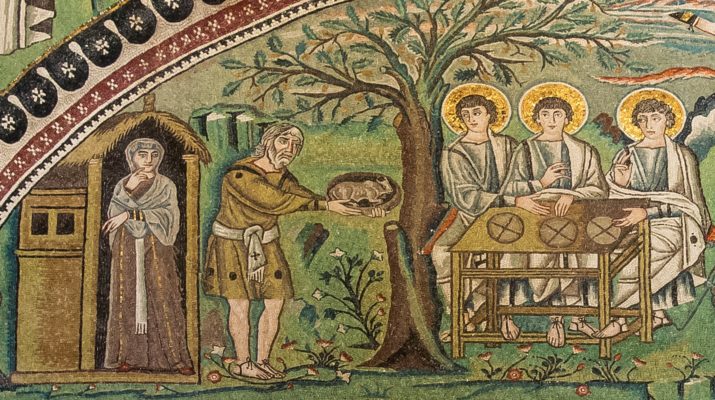Genesis 18:1-15
Ordinary A29
BibleHub
1 The LordA appeared to Abraham by the oaksB of Mamre,C as he sat at the entranceD of his tentE in the heatF of the day.
Notes on verse 1
A “Lord” = YHVH. From havah (to be, become) or hayah (to come to pass, become, be). This is the name of the God of Israel, the self-existent and eternal one, the tetragrammaton. This pronunciation has been lost to time so “Lord” is generally used in its place.
B “oaks” = elon. 10x in OT. From ayil (strength; things that are strong or powerful: political chiefs, rams, posts, trees, oaks); from the same as ul (mighty, strength, body, belly; root may mean to twist and that implies strength and power). This is terebinth, oak, or another kind of tree that is strong.
C “Mamre” = mamre. 10x in OT. Perhaps from mara (to rebel, flap wings, whip, be filthy). This is Mamre a personal name and a place name. It may mean vigor or lusty.
D “entrance” = petach. From patach (to open wide in a literal or figurative sense, loosen, plow, carve). This is opening, door, gate, entrance.
E “tent” = ohel. Perhaps from ahal (to shine, be clear). This is a tent, covering, home, or side pillar.
F “heat” = chom. 14x in OT. From chamam (to be warm or hot in a literal of figurative sense; to mate). This is heat or hot.
2 He looked upG and sawH three menI standing near him. When he saw them, he ran from the tent entrance to meet them, and bowed downJ to the ground.
Notes on verse 2
G “looked up” = nasa + ayin. Literally “lifted his eyes.”
H {untranslated} = hinneh. From hen (lo! Behold! If, though; an expression of surprise). This is to draw attention, show suddenness or surprise, or to emphasize the importance of the coming statement. See! Lo! Behold!
I “men” = ish. Perhaps from enosh (human, humankind, mortal); from anash (to be weak, sick, or frail). This is man, husband, another, or humankind.
J “bowed down” = shachah. This is to bow down, make a humble entreaty, to do homage to royalty or to God.
3 He said, “My lord,K ifL I findM favorN with you, do notO passP by your servant.Q
Notes on verse 3
K “lord” = adon. From a root that means ruling or being sovereign. This is lord, master, or owner.
L {untranslated} = na. This particle is used for requests or for urging. It can be we pray, now, I ask you, oh. This is the same “na” in “hosanna.”
M “find” = matsa. This is to find, catch or acquire. It can also mean to come forth or appear. Figuratively, this can mean to meet or be together with.
N “favor” = chen. From chanan (beseech, show favor, be gracious; properly, to bend in kindness to someone with less status). This is grace, favor, kindness, beauty, precious.
O {untranslated} = na. Same as note L above.
P “pass” = abar. This is to pass over or cross over. It is used for transitions, whether literal or figurative. It can also mean to escape, alienate, or fail. This is the root verb from which “Hebrew” is drawn.
Q “servant” = ebed. From abad (to work, serve, compel; any kind of work; used causatively, can mean to enslave or keep in bondage). This is a servant, slave, or bondservant.
4 LetR a little water be brought, and wash your feet, and restS yourselves under the tree.T 5 Let me bring a little bread,U that you may refreshV yourselves,W and after that you may pass on—since you have come to your servant.”
So they said, “Do as you have said.”
Notes on verses 4-5
R {untranslated} = na. Same as note L above.
S “rest” = shaan. This is to lean or support oneself. So, it can mean to rely or trust.
T “tree” = ets. Perhaps from atsah (to shut, fasten, firm up, to close one’s eyes). This is tree or other things related to trees like wood, sticks, or stalks. It can also refer to wood products like a plank or staff or gallows. Additionally, this can refer to a carpenter.
U “bread” = lechem. From lacham (to eat, feed on). This is bread, food, loaf. It can refer to food more generally for people or for animals.
V “refresh” = saad. 12x in OT. This is to support, uphold, or sustain. It can mean refresh or comfort.
W “yourselves” = leb. May be related to labab (to encourage; properly, to be encased as with fat; used in a good sense, this means to transport someone with love; used in a bad sense, it can mean to dull one’s senses). This is the heart, courage, one’s inner self, the mind, or the will. Heart is only used in a figurative sense in the Old and New Testaments.
6 And AbrahamX hastenedY into the tent to Sarah,Z and said, “Make ready quicklyAA three measuresBB of choice flour,CC knead it, and make cakes.”
Notes on verse 6
X “Abraham” = Abraham. From the same as Abiram (exalted father, a high father – lofty) {from ab (father literal or figurative) + rum (rise, bring up, being high, extol, exalt, haughty; to raise in a literal or figurative sense)}. This is Abraham, father of many nations or father of a multitude.
Y “hastened” = mahar. This is being liquid, which implies flowing. So, this word implies hurrying forward, whether in a positive or negative sense.
Z “Sarah” = sarah. From the same as sarah (princess, mistress, noble lady, queen); from sar (chief, ruler, captain, official, prince). This is Sarah, meaning princess.
AA “quickly” = mahar. Same as “hastened” in v6. See note Y above.
BB “measures” = seah. 9x in OT. This is a seah, used to measure flour or grain – about 7 quarts.
CC “flour” = qemach. 15x in OT. Root perhaps meaning to grind. This is something ground, such as flour, meal, or grain.
7 Abraham ran to the herd,DD and took a calf, tender and good,EE and gave it to the servant,FF who hastened to prepare it.
Notes on verse 7
DD “herd” = baqar. From baqar (to plow, break forth; figuratively, to inquire, inspect, consider). This is cattle – an animal used for plowing.
EE “good” = tob. This is good, beautiful, pleasant, agreeable, bountiful, at ease. This word is used for goodness as a concept, a good thing, a good person. This can refer to prosperity and welfare as well as joy, kindness, sweetness, and graciousness. So, this is ethically good, but also enjoyably good.
FF “servant” = naar. May be from na’ar (to shake, toss up and down, tumble around). This is a child or a servant. It is a child in their active years so they could be aged anywhere from infancy to adolescence.
8 Then he took curds and milkGG and the calf that he had prepared, and set it before them;HH and he stood by them under the tree while they ate.
9 They said to him, “Where is your wifeII Sarah?”
And he said, “There,JJ in the tent.”
Notes on verses 8-9
GG “milk” = chalab. Perhaps from the same as cheleb (fat, finest, marrow; fat in a literal or figurative sense; the richest or best part). This is milk or cheese or suckling.
HH “before them” = paneh. Literally “before their faces.”
II “wife” = ishshah. Related to “men” in v2. From ish (see note I above). This is woman, wife, or female.
JJ “there” = hinneh. Same as {untranslated} in v2. See note H.
10 Then one said, “I will surely returnKK to you in due season,LL andMM your wife Sarah shall have a son.” And Sarah was listeningNN at the tent entrance behind him.
Notes on verse 10
KK “surely return” = shub + shub. To turn back, return, turn away – literally or figuratively. Doesn’t necessarily imply going back to where you started from. This is also the root verb for the Hebrew word for repentance “teshubah.” The word is repeated twice – the first time as an Infinitive Absolute. The Infinitive Absolute serves to emphasize the sentiment of the word. It is rather like Foghorn Leghorn’s speech pattern, “I said, I said.”
LL “due season” = et + chay. Literally “season of life.” Et is probably from anah (to answer, sing, announce); from ad (forever, all, old); from adah (to pass on, advance, decorate oneself). This is a period or season. It can also mean whenever or continually. Chay is from chayah (to live or keep alive literally or figuratively). This is alive, living, lifetime. It can also be used to describe someone’s age. It can refer to animals, plants, water, or a company or congregation of people. It is life in a very broad sense.
MM {untranslated} = hinneh. Same as {untranslated} in v2. See note H above.
NN “listening” = shama. This is to hear, call, consent, or consider. It implies listening intelligently, giving attention, and, because of these two factors, obedience and action are often implied.
11 Now Abraham and Sarah were old,OO advanced in age; it had ceasedPP to be with Sarah after the mannerQQ of women.
Notes on verse 11
OO “old” = zaqen. From the same as zaqan (beard or chin – the beard represents old age). This is old, aged, or elder.
PP “ceased” = chadal. This is properly to be flabby – it implies, to stop, fall, end, rest, leave alone, forsake, or desist. Figuratively this can be lacking or idle.
QQ “manner” = orach. From arach (to go, travel, wander). This is a road that is widely used, highway, caravan, traveler, troop.
12 So Sarah laughedRR to herself,SS saying, “After I have grown old,TT and my husbandUU is old,VV shall I have pleasure?”WW
Notes on verse 12
RR “laughed” = tsachaq. 13x in OT. This is to laugh, mock, play, make sport. It is laughing out loud whether in joy or in a scornful way.
SS “to herself” = qereb. Perhaps from qarab (to come near or approach). This is among, in the midst, before, the center It is the inward part, whether literal or figurative. It can also be used for the heart, the site of thoughts and feelings. This word is also used as a technical term for the entrails of the animals who are sacrificed.
TT “grown old” = balah. 17x in OT. This is to grow old, wear out, consume, waste, enjoy, fail, decay.
UU “husband” = adon. Same as “lord” in v3. See note K above.
VV “is old” = zaqen. Related to “old” in v11. From the same as zaqan (see note OO above). This is being old or becoming old. It can also refer to an old man.
WW “pleasure” = eden. 5x in OT. From adan (to luxuriate, revel; also, to be pleasant or soft). This is delicate, luxury, or a delight.
13 The Lord said to Abraham, “Why did Sarah laugh, and say, ‘Shall I indeedXX bear a child, now that I am old?’ 14 Is anythingYY too wonderfulZZ for the Lord? At the set timeAAA I will return to you, in due season, and Sarah shall have a son.”
Notes on verses 13-14
XX “indeed” = umnam. 5x in OT. From aman (to believe, endure, fulfill, confirm, support, be faithful, put one’s trust in, be steadfast; figuratively, to be firm, steadfast, or faithful, trusting, believing, being permanent, morally solid) OR from omnam (indeed, truly, no doubt); {from aman (see above)} OR from omen (faithfulness, truth); {from aman (see above)}. This is truly, really, or indeed. It shares a root with the word “amen.”
YY “anything” = dabar. From dabar (to speak, declare, discuss). This is speech, a word, a matter, an affair, charge, command, message, promise, purpose, report, request. It is a word, which implies things that are spoken of in a wide sense.
ZZ “too wonderful” = pala. From pele (wonder, miracle, wonderful, marvelous thing). This is to be extraordinary, to arise, to be great or accomplish.
AAA “set time” = moed. From yaad (to appoint, assemble or gather selves, agree). This is a meeting, assembly, fixed time. It can be used for a festival or feast. It can also refer to a meeting place.
15 But Sarah denied,BBB saying, “I did not laugh”; for she was afraid.CCC
He said, “Oh yes,DDD you did laugh.”
Notes on verse 15
BBB “denied” = kachash. This is deceive, fail, or deny. It can be lying or disappointing. It can also mean becoming lean or cringe.
CCC “was afraid” = yare. This is to fear, be afraid, dreadful. It can also refer to fearful reverence – to fear in a moral sense is to say to revere, respect.
DDD “yes” = lo. Literally “no.”
Image credit: “Sarah and Abraham Offer Hospitality to the Visitors” from approximately 526 to 547 – mosaic in Ravenna, Italy.




